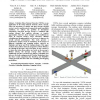511 search results - page 62 / 103 » Analysis of Multi-Organization Scheduling Algorithms |
111
click to vote
FOCS
1995
IEEE
15 years 5 months ago
1995
IEEE
Abstract. Littlestone developed a simple deterministic on-line learning algorithm for learning k-literal disjunctions. This algorithm (called Winnow) keeps one weight for each of t...
HPDC
2009
IEEE
15 years 8 months ago
2009
IEEE
Advances in the development of large scale distributed computing systems such as Grids and Computing Clouds have intensified the need for developing scheduling algorithms capable...
116
click to vote
MOBIHOC
2006
ACM
16 years 1 months ago
2006
ACM
To date, topology control in wireless ad hoc and sensor networks--the study of how to compute from the given communication network a subgraph with certain beneficial properties--h...
140
click to vote
ICPPW
2009
IEEE
14 years 11 months ago
2009
IEEE
Vehicular Delay-Tolerant Networks (VDTNs) are an application of the Delay-Tolerant Network (DTN) concept, where the movement of vehicles and their message relaying service is used ...
137
click to vote
INFOCOM
2003
IEEE
15 years 7 months ago
2003
IEEE
Abstract—Uplink scheduling in wireless systems is gaining importance due to arising uplink intensive data services (ftp, image uploads etc.), which could be hampered by the curre...

